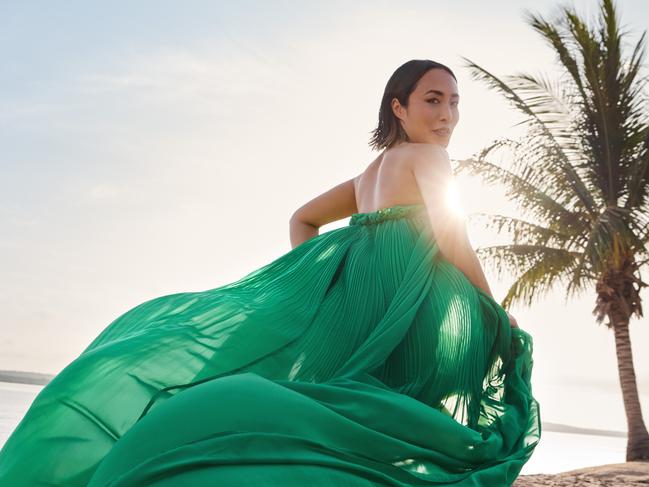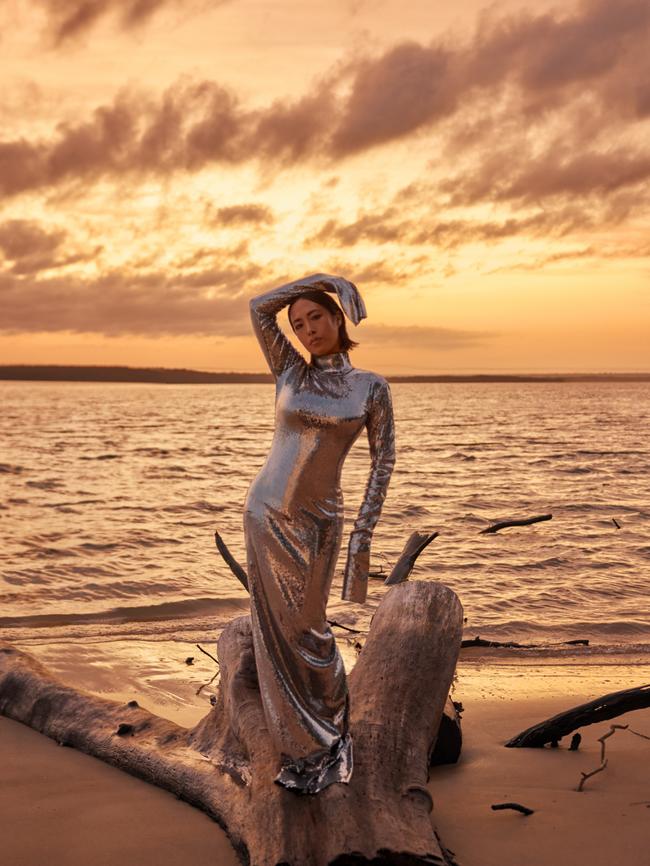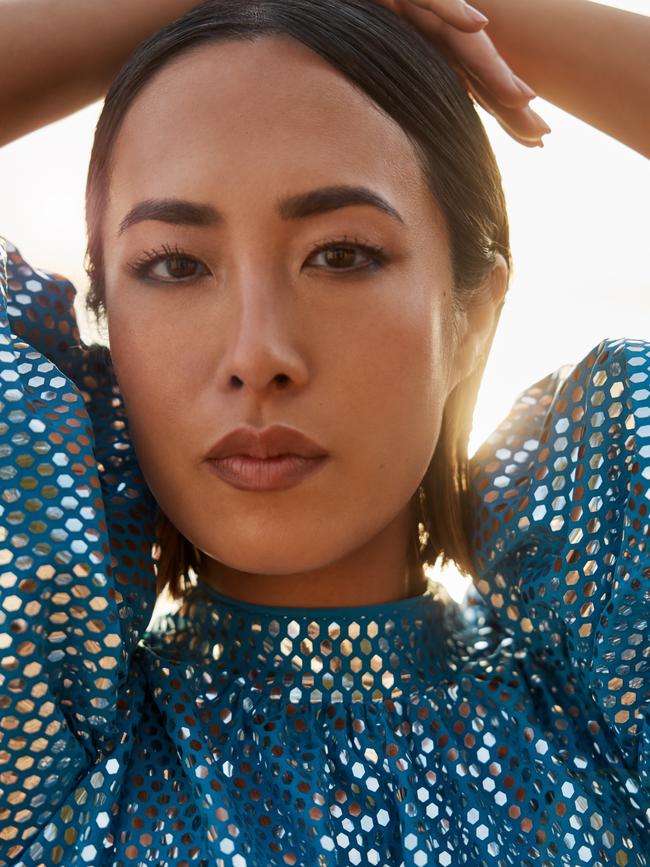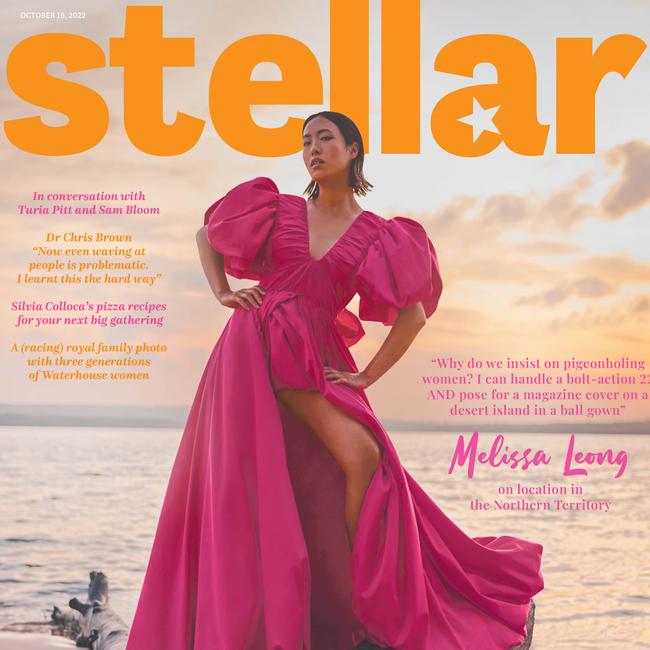Melissa Leong on why divorce is not a failure
The notoriously private Masterchef judge opens up about love and loss in the public eye, a ‘scary’ encounter with the paparazzi, and learning to set boundaries.
Stellar
Don't miss out on the headlines from Stellar. Followed categories will be added to My News.
In the three years since she became the first female judge on MasterChef Australia, Melissa Leong has made her mark with audiences and critics alike. Whether sharing her passion for food, love of fashion or views on race and representation, Leong cultivates a thoughtful space in the Australian cultural landscape. As she visits the “unapologetically wild” Northern Territory with Stellar, Leong opens up about her whirlwind run in the spotlight, why she doesn’t consider her divorce a failing and how she learnt to set boundaries.
Of the many special moments Melissa Leong has experienced since becoming a judge
on MasterChef Australia three years ago – to say nothing of the not-so-special ones such as marathon days of filming, inedible concoctions or heartbreaking contestant eliminations – few stand out like the one that went to air in June 2020.
The country was only a few months into lockdown, and Leong, like millions of others, longed to see her family again.
On the set, return competitor Poh Ling Yeow had cooked a Southeast Asian nyonya chicken curry. After trying the dish, Leong began crying, right in front of a baffled cast and crew.
They were, she explained, happy tears – but her reaction was still bittersweet. That’s because the curry tasted like home, and she missed her mum.
It was a fleeting glimpse of personal insight from Leong, who rarely talks about her parents and takes a characteristically pragmatic approach to the fame she’s still learning to grapple with after three seasons on a popular TV show that made her a household name across Australia.
“I have a public job, but my friends and my family do not,” Leong, 40, tells Stellar. “They didn’t invite this in. So I’m very respectful of their privacy. They deserve that.”

What she will say, in a sly response to the question of whether her mother watches her on MasterChef, is this: “I get comments.”
Her mum, Leong adds, did indeed watch the episode where she cried.
“I’m proud of that moment. Because it’s why I got into food in the first place. It carries so much: emotion, nostalgia, history, culture and memories. And isn’t that magical?”
Leong is not one to slip into hyperbole, but during a nearly hour-long chat with Stellar from a hotel room in Darwin, there are moments like this, when she can’t quite help it.
She excitedly speaks of still being gobsmacked by a recent visit to the Tiwi Islands (located 80km north of the Northern Territory’s capital city), which found her rising at 4.15am on a Friday morning so she could head to the beach and pour herself into an array of colourful ballgowns and shimmering metallic dresses to pose for this issue’s cover.
“It was totally worth it,” she enthuses of the early start. “When you’re in places like this, if I don’t see dawn and dusk, it’s a bit of a waste. As much as I’m not a morning person, you never regret a sunrise up here.
“The sunsets are magical, too – some of the best in the world. I saw one the other night… it was like a graduated rainbow of colours.
“I was looking at it as I sat on the beach at a long table festooned with lights, eating fresh mud crab that had been plucked from nearby, a cold beverage in my other hand. It was one of those moments where you have to pinch yourself and wonder if it’s real.”
It would be easy to presume that Leong has had more than her share of them in the past few years, given that her success on MasterChef Australia has taken her from well-respected food journalist and cookbook editor – albeit one who had also done time working in an abattoir; as a marketing and PR consultant; as a radio broadcaster; and even as a make-up artist – to a full-blown TV star with a healthy fan base and, as of this year, a Gold Logie nomination under her belt.
But it hasn’t entirely been a cakewalk.
Aside from the loneliness she endured while filming the first two seasons during ongoing lockdowns in Melbourne, where she lives, Leong also announced at the end of 2020 that she had separated from her husband of nearly four years.
Today, she can report that they remain on good terms.
“I’m very lucky that we have a mutual respect, an enduring friendship and the greatest hope for each other’s happiness. That wasn’t a line or a PR stunt to placate people. It’s true,” she tells Stellar.

Leong – who has openly spoken of her struggles with depression and anxiety – adds, “Just as much as it’s important to destigmatise mental health, it’s important to destigmatise divorce being a ‘failure’. It’s not.
“As with all interpersonal relationships – friendships, working experiences, romances – sometimes things need to get messy until they can clarify themselves. And that’s OK.
“I don’t think it’s good to be hard on yourself. Sometimes things end, and it’s better for both parties to acknowledge it and give each other a chance at future happiness by disengaging and moving on.”
And she has; in September 2021, Leong used her Instagram feed to make public a new relationship with Rob Mason, an entrepreneur and founder of the Melbourne-based cosmetics company Morris Motley.
Ever vigilant about trying to stay respectful of her loved ones’ privacy, Leong tells Stellar that she only did so after nearly ending up in a car accident thanks to paparazzi who were trailing the pair.
To this day, she remains baffled as to why they cared so much in the first place.
“I know it’s a job they do, but it’s not a very nice job,” she says. “And it’s very scary to be on the other end of it. I [made the Instagram announcement] to take a little bit of control back into my life.”
While this self-preservation mechanism has served Leong well, it has also resulted in the occasional inability to “do it all”.
When the nominees for Australian TV’s biggest prize gathered on the Gold Coast for a photo call in May, Leong was the only one who was absent – because she was too busy doing the work that earnt her the nod in the first place.
“We were in Tasmania filming [for MasterChef],” she explains. “And there was just no way for me to get to Queensland on time. I would have loved to have been there with those amazing human beings nominated alongside me, and to fully live out that experience. But the show comes first and the work will always come first.”

In many ways, it was true to industrious form for Leong.
“You know, I still have that freelancer mentality: take the job, take the job, take the job,” she admits.
“There’s always the temptation to take everything on, even though I now have a more permanent job. Because you don’t know when it’s going to stop. We have no control over what comes next.
“I’ve had to become more unapologetic about drawing the line – you take on too much and you stop being able to be present and think clearly.
“It’s about having a healthy enough sense of self-worth to know that what is meant to be will be. And we need to let go of what could have been, because what could have been never was. So there’s no point hanging on that.”
Accolades from critics and her peers have been a welcome reward after three years on MasterChef Australia but, more importantly for Leong, the real gift has been connecting with the show’s audience.
“I had a bit of a delayed reaction to receiving feedback in person because, of course, we started during Covid,” she says, before launching into the story of a recent encounter.
“I was at the chemist, and this lady sort of crept up to me and tapped me on the shoulder and said, ‘I’m sorry. I just needed to say thank you.’ And I was like, what do you mean? She said, ‘Your being there matters.’
“So, we had a little moment in the toothbrush aisle. And I thought, if what I do matters to someone and impacts them positively, then yeah! I’m proud of what I get to do.”
Despite being a first generation Asian-Australian whose parents migrated from Singapore in the 1970s, Leong is still reticent to consider herself a trailblazer.
“Have I noticed differences in the couple of years since I took the job? Absolutely. It’s wonderful to see more representation and diversity in the media. It’s a wonderful thing to be a part of.
“But when people tell me I’m leading the charge… I don’t think that at all.
“I’m proud to be part of a groundswell of amazing humans who are all beating their own drum. What we can do best for each other is to be happy for and support each other. Because the tide raises all boats.”
Leong’s presence has not been without a predictably ignorant bit of backlash, but she says she’s learnt to see her critics as “people who are still struggling with their own sense of happiness.
“I’m aware more and more these days what’s a ‘me thing’ and what’s a ‘them thing’. It’s been a huge learning curve to let go of other people’s ‘things’. People who think diversity comes at the detriment of others are entirely missing the point.”
![Melissa Leong: '[women] deserve the right to be nuanced' Picture: Christopher Ferguson](https://content.api.news/v3/images/bin/abc51bb21f20a61b09713df16c75c249?width=650)
When Leong appeared in Stellar in November 2019, it marked her first magazine cover.
She spoke then of crying when she saw Crazy Rich Asians star Constance Wu on the cover of Time magazine the year prior.
This week, Wu will release a memoir. In it, she examines the repercussions (including a suicide attempt) after she tweeted in 2019 of her frustration at being locked in to a final season of her TV show Fresh Off The Boat as it meant she couldn’t take other jobs, and the toll it took upon her when she was accused of being ungrateful, selfish and privileged.
Stellar asks Leong whether the reaction reinforced long-held societal expectations of how Asian women should behave, and if she ever feels the same sort of pressure.
“Isn’t it funny that we can be one or the other, but nothing in between?” she asks.
“And certainly not a combination? How dare we be multifaceted. It’s the craziest thing. It’s that whole discussion of women in general: you can either be extremely pious and subservient or you must be a slut.
“You can’t just be a woman who embraces her identity and her sexuality and all the feelings and emotions of what it’s like to live in this world as a woman.
“Especially in areas like entertainment or media, there’s this desperate need to categorise and pigeonhole people. We deserve the right to be nuanced.”
One could say Leong serves as a prime example.
Never likely to toe the line, she wants to continue upending assumptions – not just those placed on her by others, but also the ones she places on herself. It’s why she chose to write a children’s book earlier this year.
“It’s way more challenging than you think,” she reveals.
“I’ve always been taught to write to my audience as best I can, but when that audience is, you know, six- to nine-year-old kids? Yeah… you have to be clever. My hat goes off to people who write for children full time.”
It’s also why she bangs the drum for the “unapologetically wild” Northern Territory.
“The Australian wanderlust really tempts us overseas before we look in our own backyard. That’s a lost opportunity to discover some of the most impactful, visceral, exciting travel experiences you can have. It’s all right here.”

Already this year, she has jetted there to escape winter’s chill and enjoy warm-weather adventures like chasing barramundi and walking around Uluru.
“It’s funny because people think, oh, you’re a city girl. You’re really into glam stuff. And that is one part of me, for sure.
“But I’ve also learnt how to shoot and hunt and all the rest of it. I’m allowed to be able to handle a bolt-action 22 [rifle] and shoot the cover of a magazine on a desert island while wearing a ball gown. I can do both.”
More Coverage
Originally published as Melissa Leong on why divorce is not a failure




